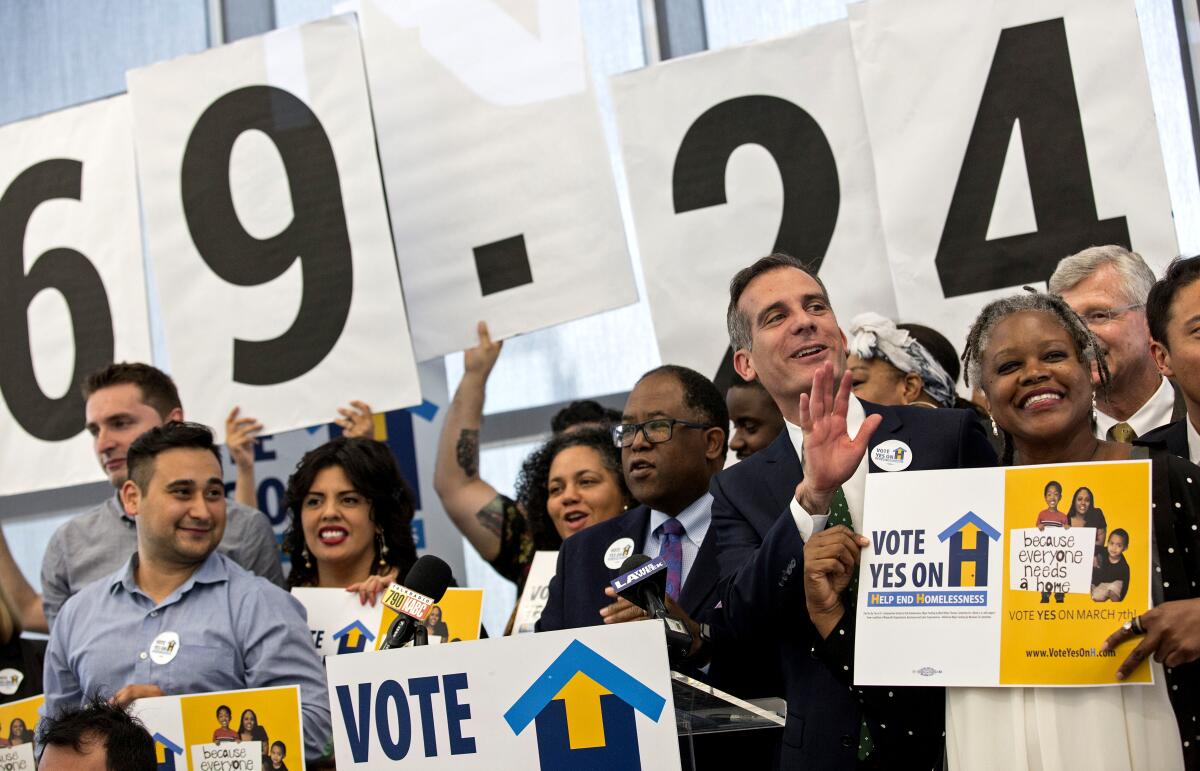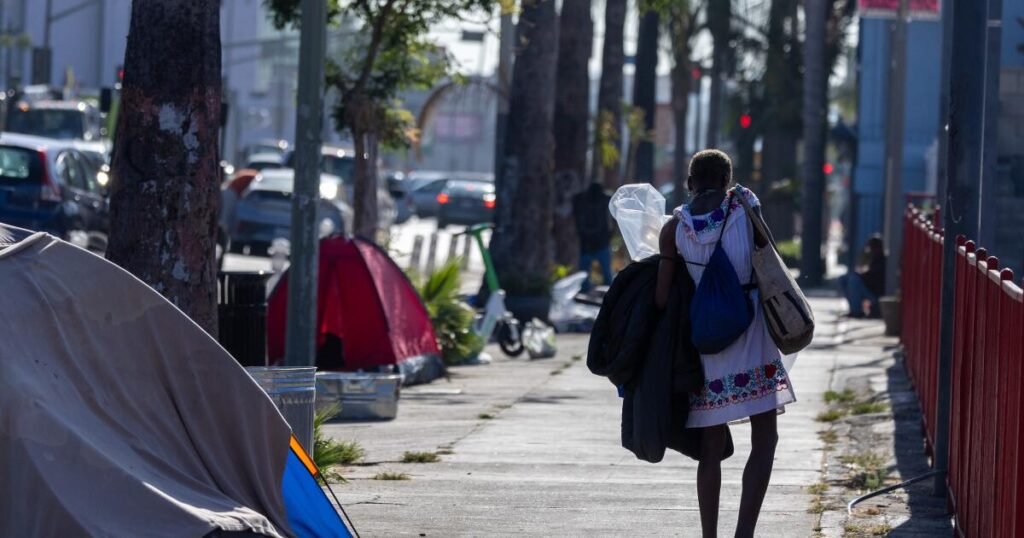A measure to double the county's homeless sales tax on the November ballot is topping early polls of Los Angeles County voters but has not yet garnered enough support to pass.
Forty-seven percent of voters surveyed said they would vote in favor of the new half-cent tax if an election were held immediately, three percentage points short of the majority needed for passage, while 36% said they would vote against it and 17% were undecided.
The lukewarm support is reflected in voters' views of progress on the hundreds of millions of dollars raised through the current tax plan, “Measure H,” which was approved by more than two-thirds of voters in 2017. Fifty-one percent said they were very dissatisfied with the outcome, and 6% said they were somewhat dissatisfied.
Despite the county's homelessness initiative spending more than $600 million in the 2023-2024 budget, the homeless population has plateaued this year after five years of steady increases.
The poll, conducted by the University of California, Berkeley Institute of Governmental Studies between July 31 and August 11 and co-sponsored by The New York Times, has a margin of error of 3 percentage points, meaning the odds are currently tied.
“47 percent is an interesting number,” said Mark DiCamillo, director of the Berkeley IGS poll. “It's close. We expect it to be a close election.”
The new measure, officially called the “Affordable Housing, Homelessness Solution and Prevention Measure,” replaces Measure H, which is set to expire in 2027 and will be extended indefinitely unless repealed by a new vote.

Then-Los Angeles County Supervisor Mark Ridley-Thomas (center) and then-Los Angeles Mayor Eric Garcetti (right) stand with supporters of Ballot Measure H as the final results were announced in Los Angeles on March 17, 2017, showing the measure passing with 69.24% of the vote.
(Brian van der Burg/Los Angeles Times)
It is expected to raise $1.2 billion annually.
The funds would fund homelessness prevention programs, including mental health and substance abuse treatment, affordable housing, rent assistance, job counseling, and services for homeless families, veterans, battered women, seniors, and vulnerable populations, including people with disabilities.
The 20-page ballot measure specifies that 60 percent of the revenue would go toward homeless services, with 15 percent of that money distributed to cities based on an annual point-in-time count. Another 35.75 percent would go to the Los Angeles County Affordable Housing Solutions Authority, a new agency created by the California Legislature last year to help homeless people stay in their homes and to increase housing and shelter for homeless people. The money could be used for rent assistance, buying or leasing existing housing, or building new housing.
Supporters of the bill said they designed it to be a more results-focused strategy for spending funds than Measure H and to incorporate clearer accountability.
The bill would require programs to set and achieve specific goals and mandate periodic audits to ensure that programs that demonstrate the highest effectiveness receive adequate funding.
Supporters of the bill said they weren't surprised by the responses to the poll's two questions about sales taxes, which came at the end of a long series of questions about the Los Angeles County district attorney election.

A homeless man waits for transportation to a residence near an encampment undergoing cleanup along Hollywood Boulevard and Gower Street in Hollywood on Thursday.
(Brian van der Burg/Los Angeles Times)
Their own polling earlier this year put support at 60%, and the latest poll shows that while support is just shy of 50%, it still far outnumbers opposition.
“We were ahead in the February polls, but in this one we're up 11 points because voters want new strategies for safer and cleaner communities, including removing encampments, improving mental health treatment and implementing accountable programs to reduce homelessness,” said election consultant Yusef Robb.
“If that funding is lost, people will lose services, they will lose housing and homelessness will increase by at least 25 percent. No one wants to go back and it would be disastrous if this bill doesn't pass,” Robb said.
Two committees are gearing up for the campaign, which is due to begin next month.
A poll released in March by the Angeleno Project, a nonprofit group that supports the bill, found that 60% of voters were expected to support the bill, with 39% of respondents saying they definitely supported it, 15% saying they supported it but might change their mind, and 6% saying they were leaning toward it.
A breakdown of the February survey results shows even greater support for specific elements of the measure: increasing mental health treatment for homeless people (82%), preserving existing affordable housing (78%), reducing the cost of building affordable housing and housing for homeless people (77%), reducing the strain on local emergency rooms (74%), creating pathways out of poverty through construction (74%), and building more affordable housing (72%).
The latest poll reveals stark divisions along political ideology and income lines: 68% of people who identify as liberal are in favor, compared with 23% of conservatives, and lower-income people are more likely to support the bill: 60% of people earning between $60,000 and $99,999 say they support it, compared with just 31% of those earning between $100,000 and $199,999.
DiCamillo said the Berkeley IGS poll plans to survey voters again in September and October.
“We're going to get a more accurate picture of who will be voting as we get closer to the election,” DiCamillo said. “Nobody can predict who will be voting with any accuracy until we get really close to the election.”
















